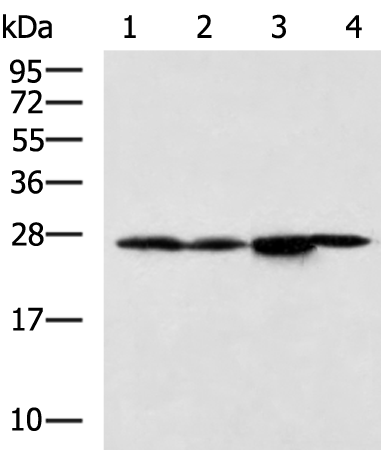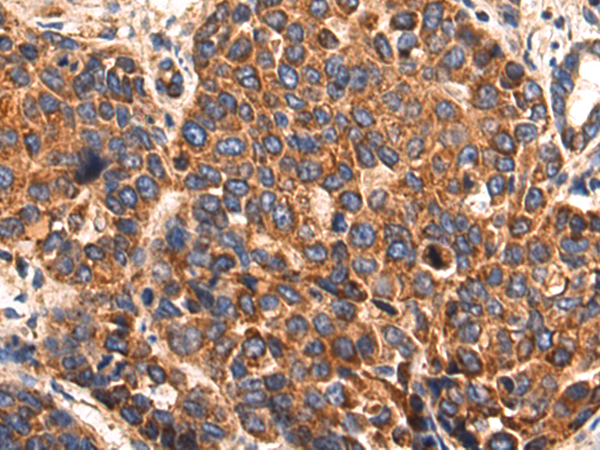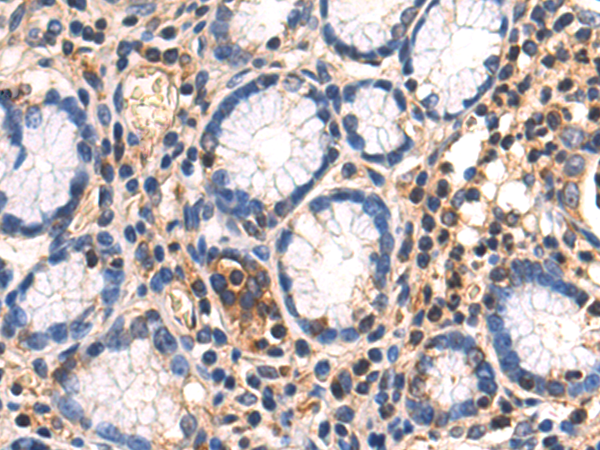


| WB | 咨询技术 | Human,Mouse,Rat |
| IF | 咨询技术 | Human,Mouse,Rat |
| IHC | 1/50-1/200 | Human,Mouse,Rat |
| ICC | 技术咨询 | Human,Mouse,Rat |
| FCM | 咨询技术 | Human,Mouse,Rat |
| Elisa | 1/5000-1/10000 | Human,Mouse,Rat |
| Aliases | ARCI12 |
| WB Predicted band size | 28 kDa |
| Host/Isotype | Rabbit IgG |
| Antibody Type | Primary antibody |
| Storage | Store at 4°C short term. Aliquot and store at -20°C long term. Avoid freeze/thaw cycles. |
| Species Reactivity | Human |
| Immunogen | Fusion protein of human CASP14 |
| Formulation | Purified antibody in PBS with 0.05% sodium azide and 50% glycerol. |
+ +
以下是关于CASP14抗体的3篇代表性文献及其摘要概括:
---
1. **文献名称**:*Caspase-14 is required for filaggrin degradation to natural moisturizing factors in the skin*
**作者**:Denecker, G. et al.
**摘要**:本研究利用CASP14敲除小鼠模型及特异性抗体,揭示了CASP14在皮肤表皮分化中的关键作用。通过免疫组化和Western blot分析,证实CASP14通过裂解丝聚蛋白(filaggrin)生成天然保湿因子(NMF),维持皮肤屏障功能。
2. **文献名称**:*Caspase-14 protects against epidermal UVB photodamage and water loss*
**作者**:Hoste, E. et al.
**摘要**:该研究通过CASP14抗体检测人体和小鼠皮肤样本,证明CASP14在紫外线(UVB)诱导的皮肤光损伤中起保护作用。实验显示,CASP14缺失导致角质层水分流失加剧,突显其维持皮肤稳态的重要性。
3. **文献名称**:*Terminal differentiation of human keratinocytes and stratum corneum formation is associated with caspase-14 activation*
**作者**:Eckhart, L. et al.
**摘要**:通过特异性抗体标记,研究团队发现CASP14在人类表皮终末分化阶段被激活,并参与角质层形成。免疫荧光结果显示,CASP14活性与丝聚蛋白代谢及细胞凋亡相关蛋白的调控密切相关。
---
以上文献均通过CASP14抗体技术(如Western blot、免疫组化)深入探究了该蛋白在皮肤屏障、光保护及分化中的分子机制。如需扩展,可结合关键词“CASP14 antibody”或“caspase-14 immunohistochemistry”在PubMed等平台进一步检索。
Caspase-14 (CASP14) is a member of the caspase family of cysteine proteases, primarily expressed in epidermal tissues and implicated in terminal differentiation of keratinocytes. Unlike apoptotic caspases, CASP14 is not involved in programmed cell death but plays a critical role in skin barrier formation by processing profilaggrin into filaggrin, a protein essential for maintaining skin hydration and integrity. Its activity is linked to epidermal maturation, UVB photoprotection, and desquamation. Dysregulation of CASP14 has been associated with skin disorders like psoriasis and atopic dermatitis, as well as certain cancers.
CASP14 antibodies are vital tools for studying its expression, localization, and activation in both physiological and pathological contexts. These antibodies are widely used in techniques such as Western blotting, immunohistochemistry, and immunofluorescence to investigate CASP14’s role in epidermal differentiation, skin homeostasis, and disease mechanisms. Recent studies also explore its potential therapeutic relevance, including modulating CASP14 activity to treat skin conditions or enhance chemotherapy resistance in tumors. Despite progress, CASP14’s precise regulatory mechanisms and substrate repertoire remain incompletely understood, necessitating further research aided by specific antibodies to unravel its multifaceted biological functions.
×